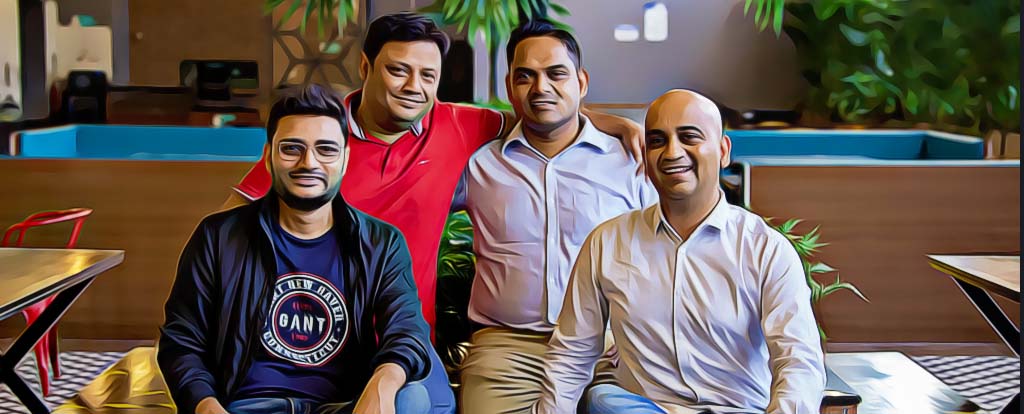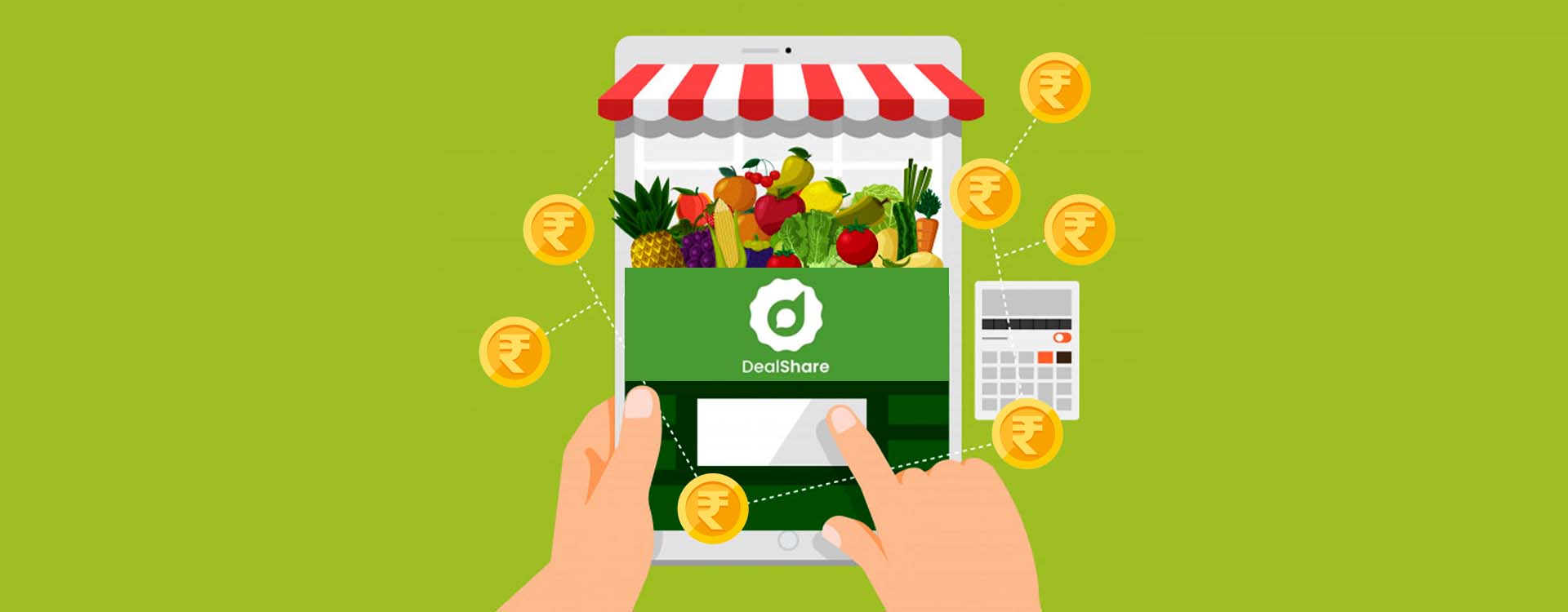Over the past few years, India has witnessed a sudden jump in the growth of e-commerce companies such as Amazon and Flipkart, making their game big. Some experts have even termed this phenomenon as ‘India’s E-commerce Boom’. But Vineet Rao and Sourjyendu Medda, founders of the social e-commerce start-up DealShare, discovered that the middle and lower middle-class Indian consumers are still new to the Internet.
The founders discovered that there is a demand for affordable value-for-money products online. This is where DealShare jumped in to fill the gap with a budget friendly e-commerce retail service.
What is DealShare?
A Jaipur and Bangalore based start-up, DealShare is a remarkably fast-growing social e-commerce platform in India that offers discounts on multi-category consumer items, targeting the ‘WhatsApp first’ users. These users include 500 million consumers in tier 2 and tier 3 cities, and rural markets that are still new to online shopping. These users are yet to learn the usage of digital and online platforms other than the traditional brick-and-mortar models.
DealShare was established in September 2018 by four young and energetic entrepreneurs – Rajat Shikhar, Sankar Bora, Sourjyendu Medda and Vineet Rao. The start-up is headquartered in Jaipur and is presently functional in Rajasthan, Gujarat, Maharashtra and Karnataka, including more than 25 cities across these states. This B2C hyperlocal e-retail business has silently flourished in the e-retail segment within a short span of time, competing with already established e-commerce giants.
To its success, the start-up focused on locally manufactured products rather than national brands, and until today, 80 to 90 per cent of the products sold on its platform are regionally produced. When a consumer buys products together with friends, the company provides exciting discounts along with free home delivery and cash on delivery offers. Its item list includes groceries, beauty products, fruits and vegetables, home decor, electronics, accessories etc.
‘‘
DealShare works on a low cost high impact model manifested towards transforming e-retail for the next billion generations
The Origin of DealShare: A Next-Gen Social E-Commerce Culture in India
Founders Sourjyendu and Vineet were school friends, and they were introduced to Sankar through a common friend. Vineet worked at Microsoft in the US for more than ten years before DealShare, and Sourjyendu was in the sales department at Metro Cash, Carry, and Raymonds. Sankar was one of the early co-founders of the fashion e-commerce platform, Myntra.
According to Sourjyendu Medda, with DealShare everything fell in place efficiently, even though the company went through a long journey before it could reach the level where it is present today. From Medda’s retail experience, he realised that the market system was quite unorganised, but the local suppliers and manufacturers had much more capacity to work on volume. Vineet Rao also understood that the retail world was transforming rapidly with the Internet, Artificial Intelligence, and social media, and it was time to make technology their tool to success. Eventually, they discovered that AI/ML and gamification in social e-commerce made it easier to connect with the consumers quickly and create awareness about the platform. Therefore, they proceeded to develop a demo model.
During the initial months, the company administered the business through WhatsApp groups as it didn’t have its own application. They started with a primary base of 100-150 customers, including their friends, employees and connections in Jaipur. This figure eventually exceeded 20,000 people. This was the breakthrough moment when their experiments were successful, and they got exceptional responses.
At that time, DealShare used to deliver everything on weekends after collecting all the orders during the week. The cherry on the top was that they did not invest much money in marketing. That was the time when they understood that they were “on to something really big” and were “solving a core need” of a vast consumer base.
Subsequently, they involved Sankar Bora and Rajat Shikhar and discussed the plan with them to come together to create DealShare. The app was made after they got surety that the consumers were constantly coming online and were ready to purchase if the app usage was uncomplicated. Banking on this response, today the application currently has more than 1 million downloads on Google Play Store.
Bumps in the Road to DealShare’s Success
The start-up, which rose exponentially in a short span of time, also encountered various challenges during the initial phase of setting up the company and expanding it. While starting off, there extensive knowledge of consumer behaviour wasn’t available as the majority of the e-commerce businesses cater to the upper economic section of the society. They had to spend a significant chunk of time with the consumers to understand various factors. As DealShare’s target consumers are the middle and lower-income families, the largest section of consumers in India, the insights were necessary.
Then another challenge was to get the network of local manufacturers as the target focus was to bridge the gap between the local manufacturers and consumers. They also faced hardships in getting the first set of consumers because their targeted customers were entirely a new set of people. It was difficult to form a network of these manufacturing suppliers because none of them envisioned working with a retail e-commerce business. Nonetheless, a few of them even decided to join an e-commerce company earlier, but the experience wasn’t satisfactory enough. But presently, 70 per cent of almost 150 manufacturers and suppliers are regional or local.

The DealShare Business Model: A Social Model
China’s Pinduoduo model dramatically influenced the DealShare business model. The Chinese model encourages consumers to make purchases in groups, and it also motivates them to share the item offers with family members and friends. This entices them to purchase the items, and this way, the chain goes on.
DealShare works on a discovery-led business model that allows its consumers to choose the best fit offers for everyday use products such as grocery, home decor, electronics, personal hygiene etc. The platform asserts to provide products at lower prices than wholesale. Its app interface is user-friendly, making the buying process highly uncomplicated for all the consumers who are new to the internet and e-commerce platforms. With just a few clicks, every item available on the app has an offer linked to it. To help the regional users operate the app efficiently, it has been made available in languages like English, Hindi and Gujrati.
According to the founders, DealShare’s is a social model. What that means is, one can also share the order links with friends for more discounts and deals. Once the order is received, the warehouse is notified by the order management team and simultaneously a pickup is arranged from said warehouse. To make this whole process effortless, particularly for aged and less technology-friendly customers, the start-up provides cost-free home delivery along with cash on delivery options.
DealShare has formed multiple WhatsApp groups consisting of existing consumers to keep them updated with all the latest deals and offers available.
DealShare’s Fundings and Investment: Broadening the Start-up Horizon
In 2019, the company raised $11 million in Series A and seed-funding rounds. The investors include Matrix Partners India, Falcon Edge Capital and other angel investors like DST Global, Omidyar Network India also took part in the financing rounds. This funding aimed to rapidly scale the business outside Jaipur in Tier II and III cities in India and double its revenue each month. The company then raised $21 million in 2020 in a new round to expand its business across the country.
The Series C round was headed by a Bangalore based company, WestBridge Capital. A venture fund led by Falcon Edge Capital, called Alpha Wave Incubation, Z3Partners, and the previous investors Matrix Partners India and Omidyar Network India all took part in the round, taking the total raised amount to be $34 million by 2020 in equity funding. The round also saw the participation of a few independent investors. The company invested the last 18 months working on its finances and is approaching profitability. DealShare is now focusing on investing in the technology part and is scaling the business to 100 cities and towns across the five states in India by 2021.
‘‘
DealShare currently has nearly 100 Whatsapp groups with over 15,000 consumers a part of these groups receiving regular updates on best offers every hour.
What Makes DealShare different from Other E-Commerce Platforms?
Focus on Niche, Underserved Strata
The company invests in average and lower average economic category customers, who are still trying to learn the use of mobile phones and e-commerce platforms for purchasing purposes. For these consumers, the heavy pocketed e-commerce companies like Flipkart and Amazon may not be the right option for now. DealShare has gained a deep knowledge of consumer purchasing behaviour and has a distinctive model which caters to the largest section of consumers in the country i.e the middle- and lower-income households.
The Sharing Model
The start-up provides exciting discounts and offers on maximum items. Consumers can benefit from more significant discounts by buying in groups with friends and family. The company brings together a melange which is acquired differently.
Expansion Plans
DealShare has always focussed on acquiring different market horizons with the help of fundings. Major e-commerce platforms have covered the top cities but have left tier II and III untouched. DealShare aims to cover 100 cities across ten states within a year. This is a key factor in what sets this revolutionary platform apart from the competition.
Paving It’s Path towards the Biggest Social E-Retail Business
While advancing, Sourjyendu explains that the company’s goal is to strengthen the network in all the states they have already covered. DealShare presently delivers around 25,000 daily orders, and targets to expand its 20 lakh consumer base to at least a crore of consumers by the end of 2021. This will increase DealShare’s brand presence over existing and new sectors and will take the company’s annual GVM (gross merchandise value) to Rs. 2500 crore.
With news investments, significant augmentation will take place for the brand and the platforms as whole with the aim of boosting DealShare’s presence across existing and new markets. By the end of next year, the start-up plans to cover 100 cities and towns over five states. The company’s focus is now to take the next step towards growth, including scaling up to new cities, expanding operations and regional sourcing network and improving its grip over technology over business verticals.
For more inspiring stories, check out our Inspire Section!




